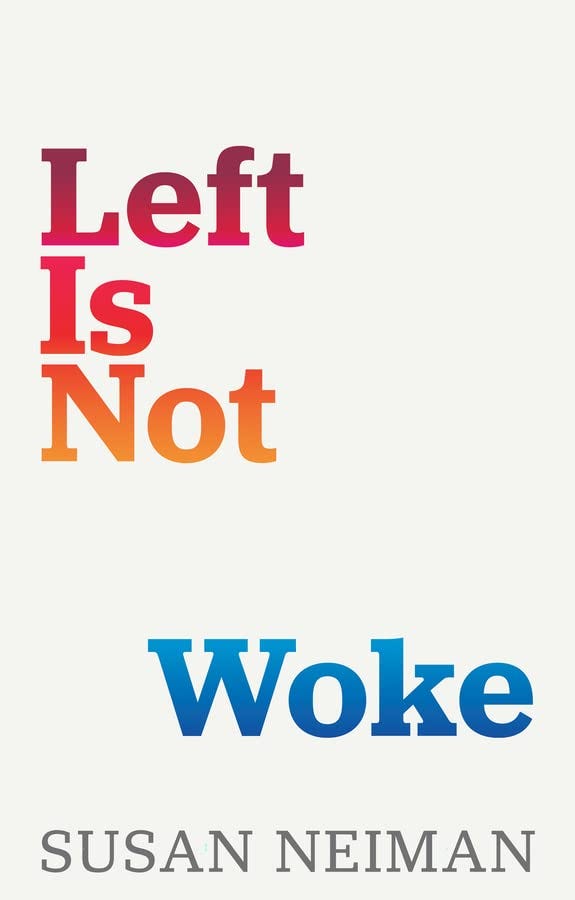The Left Must Champion Universalism Again
Graeme Kemp reviews ‘Left Is Not Woke’ by Susan Neiman (2023)
Susan Neiman is an important figure: a thinker and philosopher on the political left who rejects ‘woke’ ideology. Her commitment lies in a form of left-wing thought that emphasises three core values: universalism, a distinction between justice and power, and a belief in progress. For Neiman, the infiltration of ‘woke’ ideas into the left represents a threat to these three foundational tenets of genuine left-wing thinking.
Historically, Neiman observes, the left has championed the rights of workers, universal education, accessible healthcare, and decent housing. Yet today, the embrace of identity politics by many on the radical left risks alienating ordinary voters, driving them disillusioned into the arms of the right-wing. Trump, predictably, receives mention here. Neiman argues that the left must actively refute ‘woke’ ideas and cease blaming right-wing forces for every aspect of the culture wars.
Indeed, there seems to be a right-wing identitarian backlash against left-wing progressive identitarians. If ethnic minorities stand up for their group rights, why shouldn’t white majorities do the same? Such dynamics are regressive and foster an increasingly tribal atmosphere.
New theories such as Postcolonialism, Neiman argues, only exacerbate tribalism and division, undermining unity based on universal humanity. To recover, the left must rethink many of its basic beliefs, including a return to Enlightenment ideals that the far-left and ‘woke’ radicals have increasingly dismissed. Identity politics, she contends, is the antithesis of universalism.
How, then, does Neiman define ‘woke,’ including related ideas like intersectionality? She explains:
“It begins with a concern for marginalized persons and ends by reducing each to the prism of her marginalization. The idea of intersectionality might have emphasized the ways in which all of us have more than one identity. Instead, it led to focus on those parts of identities that are most marginalized and multiplied them into a forest of trauma.” (Pages 6–7)
In short, ‘woke’ culture celebrates victimhood rather than the heroic aspects of human achievement, such as overcoming injustice. While the voices of victims were often ignored in the past, the emphasis remained on surmounting difficult experiences. For example, the former slave and abolitionist Frederick Douglass highlighted that his suffering was a prelude to triumph over adversity.
In contrast, contemporary status and recognition are increasingly conferred upon ‘suffering’ groups in society. Within this framework, proving that your misery exceeds that of others wins approval in radical circles. Previously, overcoming pain was a pathway to genuine status—but no longer.
As Neiman asks, “Do you really want to be defined by the worst thing that happened to you?” She cites the philosopher Olufemi O. Taiwo, who argues that this culture of victimhood leads to a politics of self-expression rather than substantive social change. This trend should alarm those on the left who seek genuine progress. Neiman critiques the left’s embrace of a culture of “orchestrated victimhood” (Page 22) as deeply problematic.
This victimhood culture, Neiman warns, opens the door for charlatans. Neiman notes how several white Americans have lost their jobs after trying to pass as black – and an African American actor was jailed for faking a racist attack on himself. All this mocks the real victims of actual racist attacks.
Neiman advocates for a positive alternative:
“I’d prefer we return to a model in which your claims to authority are focused on what you’ve done to the world, not what the world did to you.” (Page 25)
An identity politics based on ethnicity, she argues, reduces our multiple identities to the one over which we have the least control: race. If racial categories lack scientific validity, Neiman asserts, they should hold no place in politics.
French philosopher Jean-Paul Sartre emphasised that opposition to evils such as slavery, colonialism, racism, and sexism should be grounded in a universalist idea: we are all human beings. Neiman also reminds readers that empire-building and slavery were not exclusive to white Europeans—the Chinese, Malians, and Mughals engaged in these practices as well.
And as philosophers such as Ato Sekyi-Otu argue - it’s ridiculous to claim the idea of the ‘human’ was just an import from Europe, as some radicals do. Neiman argues that Enlightenment thinkers were often the first to critique colonial exploitation using universalist principles. She cites Voltaire’s novel Candide (1759) as an example of such advocacy. Enlightenment thinkers consistently emphasized universalism, justice, and progress.
However, Neiman critiques the influence of theorists like Michel Foucault and Carl Schmitt. Schmitt, a Nazi legal theorist, dismissed the idea of universal humanity, arguing instead that values are entirely socially constructed. His concept of the friend/enemy distinction and his critique of liberalism’s “empty” parliamentary democracy echo Foucault’s ideas about power.
For Foucault, power operates invisibly through structures and networks that shape our perception of reality. He regarded justice as a façade for power struggles. While his work remains profoundly influential—he is arguably the most cited social science researcher ever—his cynicism about justice and progress fosters a pessimistic, even nihilistic worldview.
Enlightenment thinkers, by contrast, saw reason and knowledge as tools to liberate people from prejudice and superstition. Reason demanded not only an understanding of the world but also a vision for how it could change. Neiman urges a return to this Enlightenment ethos.
In Left Is Not Woke, Neiman underscores that human rights are rooted in a genuine commitment to justice, not power. Progress may not be inevitable, but it is achievable:
“To stand on the left is to stand behind the idea that people can work together to make significant improvements in the real conditions of their own and others’ lives.” (Page 106)
Neiman critiques the left’s embrace of ‘woke’ ideas, which often reject progress in favour of power dynamics. Viewing society through Carl Schmitt’s friend/enemy lens is, she argues, a step backwards. The left must change course.
I’m not sure I fully agree with Neiman on everything. She lumps in evolutionary psychology with a range of other politically regressive ideas that really are ‘woke’. Whether evolutionary psychology deserves the same critique is a matter of debate, I think. Also, Neiman seems to support the idea that Trump’s presidential success was part of a backlash against the presidency of the black Obama – I’m still not convinced of that.
Ultimately, Susan Neiman offers a hopeful vision: a left-wing politics rooted in universalism, justice, and progress. Her critique deserves attention from both left-wing and right-wing audiences, and I hope Left Is Not Woke is widely read and discussed.




The problem with universalism is that it appeals to some unstated higher power beyond the legal system of any one nation state. Liberals reason that there cannot be a deity, so this higher power must go unidentified forever. This is the demented reasoning behind the Globalism that has created the dystopia of England's post-industrial towns and the insult to that injury of mass immigration that threatens to sink them into the third world for good. No, the Left should not champion universalism and nor should anyone else.
I'm going to say something relating to the title of the piece (straw man alert?), not necessarily about the book which sounds interesting or the review which is enlightening. But there is a problem with the term 'The Left'. This term is now used chiefly by people who oppose 'woke', centrist or 'progressive' politics. I do not see any tee-shirts or banners with the slogan 'we are The Left'. The Left has always been sectarian, in the 1980's and 90's I remember student leftist, trade unionists, Labour Party supporters, various Marxist groups and many fringe groups.
Identity politics is not Left wing, it represents a failure of the left. Identity politics began with race, we might also say feminism. But ethnic minorities are not traditionally part of the left. The left supported these groups, sometimes in good faith, sometimes in the hope of some quid pro quo; that these groups would support the revolutionary struggle or worse be the foot soldiers of the revolution.
My second related point is that the title is an imperative. Who is it aimed at? No one follows imperatives anymore. Even our governments seek to 'nudge' us, or clothe their objectives in therapeutic language; 'this will be good/bad for your mental health'. Not only can we not identify 'The Left', but we can't identify anyone who will respond to this imperative. I'm not saying that our situation is hopeless, if the writer, reviewer, or anyone else wants to create a new universalist movement, I might even join myself. But I don't believe that this movement already exists and is just waiting to be mobilised; The Left will not deliver, there is no 'Left' to appeal to or mobilise.
We are faced with the laborious process of recruiting/saving? souls one by one wherever they come from. Some of us seek redemption, but not all of us.
PS Identity politics is a means by which the political establishment seeks to manage political conflict or dissent. In British politics today the language of left and right does not help us to understand those who govern.